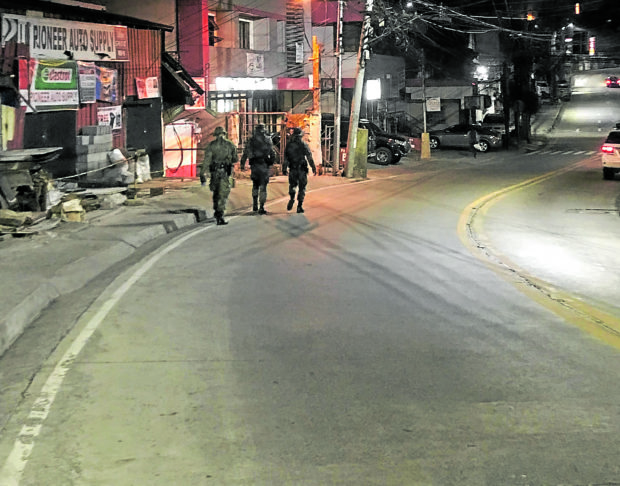
LOCKDOWN WOES Policemen patrol the deserted streets of Baguio City at the height of the coronavirus lockdown last year, as city officials kept residents indoors by supplying food and other essential items. The city has now been flagged by the Commission on Audit for alleged “mishandling” of funds for its COVID-19 response. —VINCENT CABREZA
BAGUIO CITY, Benguet, Philippines — The city government eased government rules on purchases at the height of the Luzon lockdown last year at the onset of the coronavirus pandemic, as officials scrounged for disinfecting equipment and food for residents, Mayor Benjamin Magalong admitted amid a Commission on Audit (COA) report on alleged mishandling of local funds.
But all of the lockdown expenses were properly accounted for, the mayor said in response to a COA notice that flagged the local government for what appeared to be accounting lapses in 2020, the year when the global coronavirus pandemic was declared.
“There is no corruption here,” stressed Magalong, who serves as the country’s contact tracing czar, at a press briefing here.
He added: “Could you have planned for disinfectants and sprayers which we suddenly needed? We were doing our best to study and learn about COVID-19.”
According to Audit Observation Memorandum (AOM) No. 2021-008 issued by the COA on March 19, the summer capital mishandled P61 million last year when the city cleared cash advances used for pandemic-related expenses that have no details about the goods and services it secured.
Government accountants require complete technical descriptions of all purchases, their quantities, and their intended use, before cash advances are allowed.
But because of the health emergency, city departments were given leeway to secure vital goods needed to sanitize Baguio and feed 370,000 residents who were not allowed to leave their homes from March to May, said City Accountant Antonio Tabin.
Disrupted supplies
Supply chains were immediately disrupted when the first enhanced community quarantine (ECQ) covering Luzon was enforced because all businesses were shut down and travel was restricted, Tabin said.
“Even canned goods were gone and we couldn’t buy any,” Tabin recalled, prompting city employees to go to other provinces to buy sardines for relief packs.
Magalong said he had to reach out to friends “to set aside boxes of canned goods for Baguio” and also asked a Nueva Ecija mayor for help when rice supplies began to diminish.
These were instances that would not be on official records, Magalong pointed out.
“Due to the scarcity of commodities during the ECQ, it was imperative to immediately purchase what was available from suppliers operating at that time,” said the mayor in a response to AOM 2021-008 that was transmitted to the COA on March 26.
ECQ is the most stringent quarantine classification in the country.
“Hence the technical specifications and quantities could not be specified as various suppliers offered different brands or items,” Magalong added.
Tabin said it took some time for city employees to secure sales invoices and other documents from suppliers to complete the documentary requirements for the emergency purchases because of the quarantine.
Unliquidated
Tabin said as of April 23, only P5 million of the P61 million remained unliquidated but supporting documents were being gathered.
COA auditors also noted that purchases were paid in cash instead of the appropriate government checks.
But city officials, in their response, pointed out that suppliers preferred cash payments during that time as converting checks to cash was difficult due to reduced bank operating hours during the lockdown. Also, many government cashiers were also forced to work from home during that period, it added.
“Even the National Food Administration, which is a fellow government agency, refused checks. It required cash transactions,” Tabin said.
“Take it or leave it was our situation then [with public and private suppliers],” he said.
Tabin said other local governments dealt with the same problems last year at the height of lockdown.